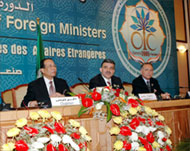UN and tsunami relief top OIC talks
Some 43 foreign ministers have begun three days of meetings at the Organisaton of the Islamic Conference (OIC) in Yemen, with UN reform and the tsunami disaster response topping the agenda.

Secretary-General Ekmeleddin Ihsanoglu welcomed officials to the Yemeni capital, Sanaa, from 56 of the 57 OIC member states from Asia, Africa, Europe and South America and new observer states Russia, Italy, Germany and Spain.
Describing the conference as an opportunity for so many Muslim nations to form a consensus on major international issues, the OIC chief opened the first session’s talks which focused on tsunami-disaster fund management.
Ihsanoglu said last December’s tsunami disaster “exposed the lack of an OIC mechanism to cope with such catastrophes”.
He also raised the issue of sponsoring orphans of the massive quake as well as the creation of a fund to face any future disasters.
UN reform
Other officials, including Yemeni Prime Minister Abd al-Qadir Bajamal, brought up the issue of Islamic representation at the UN Security Council.
“We need to present a united front if we want to achieve reform of the United Nations and its initiatives.”
Bajamal said it was only through UN reform that the Muslim world could face “the greatest challenges in our time – the disgraceful disrespect for human rights in Palestine, Iraq, Somalia and Afghanistan”.
Foreign ministers and officials are also billed to begin a second session with talk of OIC reform and an increase in its funding from member states.
Budget increase
Conference spokesman Bakhit Manan told Aljazeera.net the organisation would be restructuring over the next few months and that Secretary-General Ihsanoglu had urged member nations to help create a truly influential body on the world stage.
 |
|
Muslim nations will be asked to |
“The OIC needs structures and professionals that will give this organisation the ability to do its job – form consensus in the Islamic world.
“At the moment, and in terms of size, the OIC is the second largest body after the United Nations – but that is about as far as the comparison can go. Ihsanoglu’s message to ministers today was that to fulfil its potential, the OIC really needs to be funded adequately,” he said.
But some non-member nations are taking OIC influence seriously enough to lobby over major international issues.
Lobbying
Fearing moves by member nations towards ending non-recognition of the Turkish Cypriot state, Greece lobbied delegates hard on Monday by making parallels between the Mediterranean island and the Middle East.
According to AFP, Greek Foreign Minister George Iacovou told Palestinian chief negotiator Saeb Erikat that for Muslim nations to make any concession to Turkish pressure would “undermine Palestinian positions regarding the rights of refugees”.
Iacovou was referring to the tens of thousands of Greek Cypriots displaced by the 1974 Turkish invasion which paved the way for the current division between the island’s two communities.
The Turkish Cypriots have observer status in the OIC but their state is recognised only by Turkey.
Thailand concerned?
Meanwhile, media reports in Bangkok suggest Thailand is concerned that it may face OIC censure over its handling of unrest in the Muslim-majority south.
More than 730 people have died in near-daily attacks or clashes with security forces since January last year, when a bloody raid on a weapons depot triggered a separatist uprising in three Muslim-majority southern provinces bordering Malaysia.
Thailand’s subsequent heavy handed security tactics have worried Islamic governments.